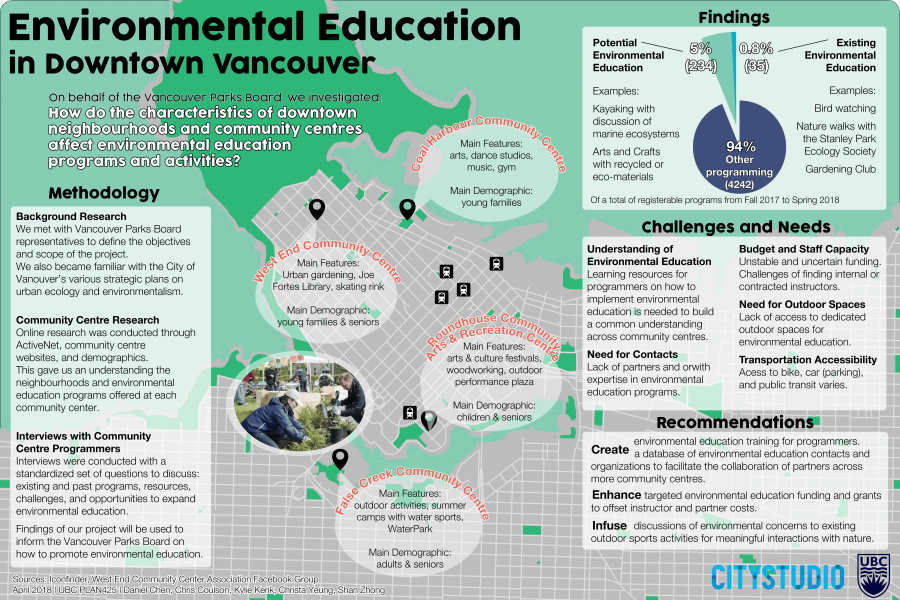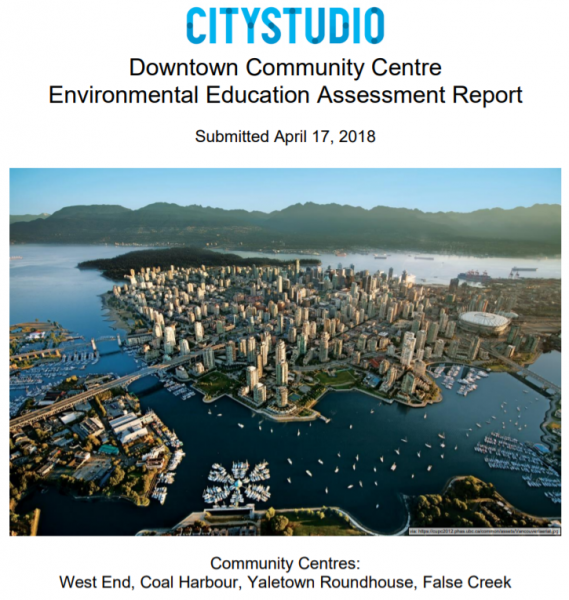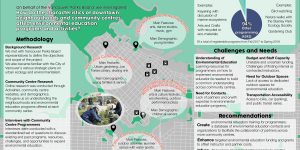
As a term-long project for PLAN 425- Urban Planning Issues and Concepts, I worked with a group of 4 students as consultants for the Vancouver Board of Parks and Recreation and CityStudio with the goals to:
Investigate existing environmental education programming in community centres
and identify opportunities for the Parks Board to expand them.
In order to produce a comprehensive scan of environmental education programming challenges and opportunities, a total of 23 community centres across Vancouver were surveyed between 5 groups in our class. Our group focused on 4 downtown community centres: Coal Harbour, West End, Roundhouse, and False Creek. Through online research and in-person interviews with community centre programmers, we wrote a group report, executive summary, and presented a poster of our findings.
This project marks the initial step in a broader process which bridges the resources of the
Parks Board with facilitators of programs at community centres to cultivate support for environmental education. Further surveys and analysis of local practitioners of environmental education will be conducted in the future to develop strategies for implementation.

What is environmental education?
According to the Environmental Education Stewardship Plan, it is defined as activities that:
- Promote or encourage outdoor experiences and connections to nature
- Can be registered through community centres or is offered through a partnership with a
community centres - Examples: community gardening programs, cedar basket weaving, removing invasive plants.
As I have been involved in environmental education as a volunteer at the Vancouver Aquarium for the past 2 years, this project was an exciting opportunity to combine my own experiences as someone involved in implementing educational programs to broader understandings of the behind the scenes research and city policy that drives these initiatives forward.

Policy Context
One exciting aspect of this project has been learning about and forming connections to the City of Vancouver's strategic plans such as the Environmental Education Stewardship Plan and Biodiversity Strategy which both promote the enhancement of and access to Vancouver’s natural areas.
Summary of Findings
In general, we found that there were very few environmental education programs currently available at the 4 community centres. Most programs are indoors and range from arts and craft to natural beauty product making and horticulture. Fewer activities occur outdoor, and when they do they are mostly out-trips or walks around the neighbourhood that happen in the Spring and Summer. This was mostly due to issues of lack of partners with expertise in environmental education, funding, and access to parks and natural areas.
Opportunities and Recommendations
One major opportunity we identified through the interviews with the programmers to easily expand environmental education across the four community centres was through integration to pre-existing programs. This was defined as "potential programs" in the findings pie chart of the poster and included for example: a meaningful discussion of marine ecosystems and ocean pollution in kayaking lessons or the importance of native bird species in a bird house making woodwork class.
We also recommend that the City of Vancouver:
- Create environmental education training for programmers, that is designed to cater to demographic needs so that programmers can learn how to include environmental education specific to their neighbourhood.
- Establish a database of environmental education contacts, organizations, and resources
that can act as potential partners in running these programs. - Assist community centres in ensuring there is adequate funding for environmental
education by increasing targeted funding to offset costs for instructors and partners.
Project Challenges
This project required a lot of coordination of stakeholders including the Parks Board and City Studio clients, community centre programmers, and other student groups at once! As in all major projects, encountered new challenges to learn from such as:
- Coordinating interviews with community centre programmers amidst busy schedules.
- Transcribing and interpreting data collected from the online program registration system and interviews to formulate a concise set of findings.
- On a personal note, it was my first time designing a poster with this much information and while it was quite challenging, I enjoyed exercising my artsy side of cartography :)!
Here are some skills I picked up in summary:
- Designed and presented a poster to summarize the project scope, methodology, and findings of environmental education in Downtown Vancouver using Adobe InDesign.
- Wrote a comprehensive report with 4 classmates to summarize the findings, challenges, and opportunities of implementing environmental education at 4 Vancouver community centres.
- Conducted interviews with Community Centre Programmers to collect primary data on available programs, community interest, and challenges of implementing environmental education.
- Liaised with the Vancouver Parks Board and local community centre programmers to identify available resources, needs, and opportunities to inform further action for the promotion of environmental education

Our group was chosen as 1 of 2 groups to proudly represent UBC at the CityStudio Hubbub event which showcases student projects from SFU, Langara, BCIT, and UBC! To see the other UBC group's work on this project see: https://www.citystudiovancouver.com/projects/rewilding-vancouver
Nice work everyone :)!